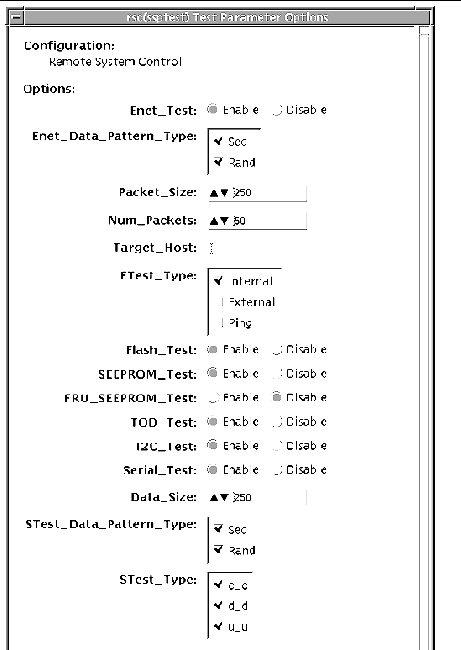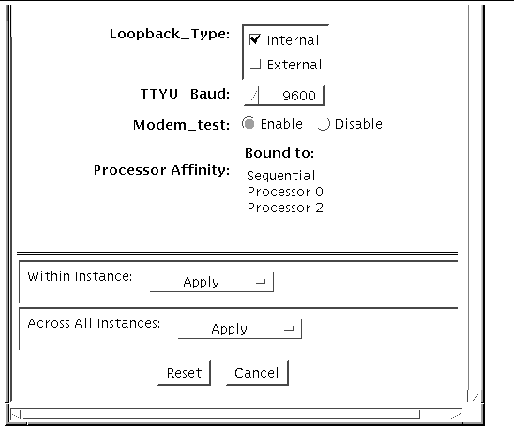System Service Processor Test (ssptest)
|
The ssptest exercises the Remote System Control (RSC) feature, which is integrated on the Sun Enterprise 250 as well as the next-generation RSC 2.0 plug-in card introduced with the Sun Fire 280R line, and Advanced Lights-Out Management (ALOM) feature. The ALOM feature is integrated into the Sun Fire V210, Sun Fire V240, and Sun Fire V440 systems.
The RSC or ALOM provides secure remote access for system monitoring, firmware updates, and failure recovery. The RSC or ALOM communicates with the host through two internal serial lines, the I2C bus, and reset lines.
The RSC 1.0 hardware consists of the controller, flash, SEEPROM, 10MB Ethernet port, and an external console serial port.
The RSC 2.0 plug-in card hardware consists of the controller, flash, SEEPROM, 10MB Ethernet port, FRUSEEPROM, Time of Day (ToD) device, internal PCMCIA modem card, and battery backup.
The ALOM hardware consists of a Motorola MPC850 processor, flash, SEEPROM, 10MB/100MB Ethernet Port, Time of Day (ToD) device, Serial Transceiver, and battery backup.
ssptest is not scalable.
ssptest Subtests
The ssptest will present different subtests and options based on which type of hardware (RSC or ALOM) and which version of RSC hardware (1.0 or 2.0) it is testing.
The subtests common to RSC 1.0, RSC 2.0, and ALOM include:
TABLE 23-1 Subtests for Both RSC 1.0, RSC 2.0, and ALOM
|
Subtest
|
Description
|
|
Ethernet
|
Allows for internal loopback testing, on the Ethernet device with user specified data, size, and number of packets.Allows for external loopback testing with user-specified data, size, and number of packets. This requires a connection to a 10MB hub or switch for RSC 1.0, or a passive loopback connector for RSC 2.0, and ALOM.Allows for a ping to be sent to a specified host and checks the response.
|
|
Flash CRC
|
Performs a checksum test on the flash device.
|
|
SEEPROM CRC
|
Performs a checksum test on the SEEPROM device.
|
|
Serial
|
Allows internal loopback testing with user-specified data and size on the two internal serial ports.
Allows for internal and/or external testing on the external ttyu port. The external test requires a passive loopback connector.
|
ssptest also presents the following subtests when running on the RSC 2.0 hardware:
TABLE 23-2 Subtests for RSC 2.0 Only
|
Subtest
|
Description
|
|
FRU SEEPROM CRC
|
Performs a checksum test on the SEEPROM device.
|
|
I2C
|
Tests the i2c bus connection between the host and the RSC.
|
|
ToD
|
Performs multiple reads to the ToD device and verifies that the time is incrementing.
|
|
Modem
|
Verifies that the modem is installed. Displays the manufacture information, in Verbose mode. Performs AT inquiry commands.
|
ssptest presents the following subtests when running on the ALOM hardware:
TABLE 23-3 Subtests for ALOM Only
|
Subtest
|
Description
|
|
I2C
|
Tests the i2c bus connection between the host and the ALOM.
|
|
ToD
|
Performs multiple reads to the ToD device and verifies that the time is incrementing.
|
The subtests call test modlets that are written in the native Real Time Operating System (RTOS) that resides in the RSC firmware. The ssptest subtests execute the test modlets, pass parameters, and retrieve results from the RSC or ALOM using a test protocol on the host to RSC or ALOM internal serial lines.
ssptest Options
To reach the dialog box below, right-click on the test name in the System Map and select Test Parameter Options. If you do not see this test in the System Map, you might need to expand the collapsed groups, or your system may not include the device appropriate to this test. Refer to the SunVTS User's Guide for more details.
FIGURE 23-1 ssptest Test Parameter Options Dialog Box (Top Section)

FIGURE 23-2 ssptest Test Parameter Options Dialog Box (Bottom Section)

|
Note - The Configuration field in the ssptest Test Parameter Options dialog box displays the which type of hardware (RSC or ALOM) is being tested. For RSC 1.0 and 2.0, Remote System Control is displayed. For ALOM, Advanced Lights-Out Management is displayed.
|
TABLE 23-4 ssptest Options
|
ssptest Options
|
Description
|
|
Enet test
|
Enables or disables RSC or ALOM Ethernet testing.
|
|
Data Pattern Type
|
Selects Sequential, Random, or both types of data patterns.
|
|
Packet Size
|
Defines the size of each data packet to be sent for all tests.
|
|
Num Packets
|
Specifies the number of data packets to send in one test loop.
|
|
Target Host
|
Specifies the IP address of a host to use for the ping test.
|
|
Enet Test Type
|
Selects any or all Internal, External, or ping tests.
|
|
Flash test
|
Enables or disables the flash checksum test.
|
|
SEEPROM test
|
Enables or disables the SEEPROM checksum test.
|
|
FRU SEEPROM test
|
Enables or disables the FRU SEEPROM checksum test (RSC 2.0 only).
|
|
TOD test
|
Enables or disables the Time Of Day test.
|
|
I2C test
|
Enables or disables the I2C test (RSC 2.0 and ALOM only).
|
|
Serial test
|
Enables or disables the RSC or ALOM serial test.
|
|
Data Size
|
Defines the data size to be sent.
|
|
Loopback Type
|
Selects Internal, External, or both. External requires a loopback plug.
|
|
Data Pattern Type
|
Selects Sequential, Random, or both types of data patterns.
|
|
Serial Test Type
|
Selects serial ports to be tested, u to u, c to c, or d to d.
|
|
TTYU_Baud
|
Select a fixed baud rate or all baud rates for testing the ttyu port. The valid baud rates under TTYU_Baud are: ALL, 300, 600, 1200, 2400, 4800, 9600, 14400, 19200, 38400, 57600, 76800, 115200. The default is 9600.
|
|
Modem Test
|
Used to Enable or Disable the RSC PCMCIA modem test (RSC 2.0 only).
|
ssptest Test Modes
ssptest supports the following tests as described in the table below.
TABLE 23-5 ssptest Supported Test Modes
|
Test Mode
|
Description
|
|
Connection
|
Reports the status of the RSC or ALOM.
|
|
Exclusive
|
Tests the RSC's and ALOM's Ethernet, flash, SEEPROM, ToD, I2C, and serial devices. All tests use the internal modes as defaults. The ssptest will not run the serial test on ttyc if the console has been redirected to the RSC. The ttu tests will not run if there is an open login on the ttyu.
|
ssptest Command-Line Syntax
RSC 1.0: /opt/SUNWvts/bin/ssptest standard_arguments -o enet=E/D, epattype=seq+rand,esize=packet_size,epkts=number_packets,target=IP_address, etest=I+E+P,flash=E/D,seeprom=E/D,serial=E/D,sdatsize=data_size, slb=I+E,spattype=seq+rand,stest=u_u+c_c+d_d,ttyubaud=baud_rate|all
RSC 2.0: /opt/SUNWvts/bin/ssptest standard_arguments -o enet=E/D, epattype=seq+rand,esize=packet_size,epkts=number_packets,target=IP_address, etest=I+E+P,flash=E/D,seeprom=E/D,fruseeprom=E/D,tod=E/D, i2c=E/D,serial=E|D,sdatsize=data_size,slb=I+E,spattype=seq+rand, stest=u_u+c_c+d_d,ttyubaud=baud_rate|all,rscmodem=E/D
ALOM: /opt/SUNWvts/bin/ssptest standard_arguments -o enet=E/D, epattype=seq+rand,esize=packet_size,epkts=number_packets,target=IP_address, etest=I+E+P, flash=E/D,seeprom=E/D,tod=E/D,i2c=E/D,serial=E/D,sdatsize=data_size,slb=I, spattype=seq+rand, stest=d_d
TABLE 23-6 ssptest Command-Line Syntax
|
Argument
|
Description
|
|
enet=enable|disable
|
Enables or disables RSC or ALOM Ethernet test.
|
|
epattype=seq+rand
|
Predefined pattern options used for Enet test.
|
|
esize=packet_size
|
Data size for each packet in the Enet test.
|
|
epkts=number_packets
|
Number of packets to send for Enet test.
|
|
target=IP_address
|
IP address of target system for Enet ping test.
|
|
etest=Internal+External+Ping
|
Selects any or all Internal, External, or ping tests.
|
|
flash=enable|disable
|
Enables or disables RSC or ALOM Flash checksum test.
|
|
seeprom=enable|disable
|
Enables or disables RSC or ALOM SEEPROM checksum test.
|
|
fruseeprom=E/D (RSC 2.0 ONLY)
|
Enables or disables RSC FRU SEEPROM checksum test.
|
| tod=E/D (RSC 2.0 and ALOM ONLY)
|
Enables or disables RSC or ALOM Time of Day test.
|
|
i2c=E/D (RSC 2.0 and ALOM ONLY)
|
Enables or disables RSC or ALOM i2c test.
|
|
serial=enable|disable
|
Enables or disables RSC or ALOM serial test.
|
|
sdatsize=data_size
|
Data size for the rsc or alom serial tests.
|
|
slb=Internal+External
|
Loopback type. External N/A on ports C and D.
|
|
spattype=seq+rand
|
Predefined pattern options used for RSC or ALOM serial test.
|
|
stest=u_u+c_c+d_d
|
Defines port and configuration to use for RSC or ALOM serial test.
|
|
ttyu_baud=ALL|specific_baud
|
Defines baud rates to be used in testing the RSC's console port. The valid baud rates under ttu_baud are: ALL, 300, 600, 1200, 2400, 4800, 9600, 14400, 19200, 38400, 57600, 76800, 115200. The default is 9600.
|
|
rscmodem=E/D
|
Enables or disables the RSC PCMCIA modem test.
|
|
Note - 64-bit tests are located in the sparcv9 subdirectory: /opt/SUNWvts/bin/sparcv9/testname, or the relative path to which you installed SunVTS. If a test is not present in this directory, then it may only be available as a 32-bit test. For more information refer to the "32-Bit and 64-Bit Tests" section of the SunVTS 5.1 Test Reference Manual (816-5145-10).
|
| SunVTS 5.1 Patch Set 4 Documentation Supplement
| 817-3407-10
|     |
Copyright © 2003, Sun Microsystems, Inc. All rights reserved.

